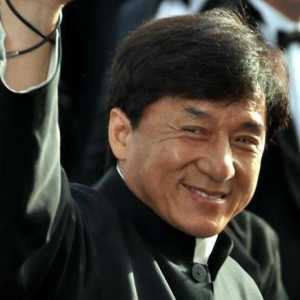Jackie Chan SBS MBE PMW (born 7 April 1954, Chinese: 成龍, Yale romanization: Sìhng Lùhng, Jyutping: Sing4 Lung4; lit. "becoming the dragon") is a Hong Kong actor, filmmaker, martial artist, and stuntman known for his slapstick acrobatic fighting style, comic timing, and innovative stunts, which he typically performs himself. Chan has been acting since the 1960s, performing in more than 150 films. He is one of the most popular action film stars of all time.
Chan is one of the most recognisable and influential film personalities in the world, with a widespread global following in both the Eastern and Western hemispheres. He has received fame stars on the Hong Kong Avenue of Stars and the Hollywood Walk of Fame. Chan has been referenced in various pop songs, cartoons, films, and video games. He is an operatically trained vocalist and is also a Cantopop and Mandopop star, having released a number of music albums and sung many of the theme songs for the films in which he has starred. He is also a globally known philanthropist and has been named one of the top 10 most charitable celebrities by Forbes magazine. In 2004, film scholar Andrew Willis stated that Chan was perhaps the "most recognised film star in the world." In 2015, Forbes estimated his net worth to be $350 million, and as of 2016, he was the second-highest-paid actor in the world.
Chan's views on Hong Kong politics have gradually shifted from a pro-democratic stance in the 1990s to a pro-Beijing stance since the 2010s. Since 2013, Chan has been a pro-Chinese Communist Party (CPC) politician, having served two terms as a delegate to the Chinese People's Political Consultative Conference, and, in 2021, expressing his desire to join the CPC.
Early life
Chan was born on 7 April 1954 in British Hong Kong as Chan Kong-sang (Chinese: 陳港生; lit. 'Chan the Hong Kong-born') to Charles and Lee-Lee Chan, political refugees from the Chinese Civil War. In circa 1937, Chan's father, originally named Fang Daolong, briefly worked as a secret agent for Lieutenant General Dai Li, the chief spy in Kuomintang-ruled China. For fear of being arrested by the communist government, Chan's father fled to British Hong Kong in the 1940s and changed his surname from Fang to Chan. Chan was his wife Chan Lee-lee’s surname. Chan discovered his father's identity and changed his Chinese name to Fang Shilong (房仕龍) in the late 1990s, the name he would have been named according to his kin's genealogy book.
Chan spent his formative years within the grounds of the French consul's residence in the Victoria Peak, British Hong Kong, as his father worked as a cook there. Chan attended the Nah-Hwa Primary School on Hong Kong Island, where he failed his first year, after which his parents withdrew him from the school. In 1960, his father emigrated to Canberra, Australia to work as the head cook for the American embassy, and Chan was sent to the China Drama Academy, a Peking Opera School run by Master Yu Jim-yuen. Chan trained rigorously for the next decade, excelling in martial arts and acrobatics. He eventually became part of the Seven Little Fortunes, a performance group made up of the school's best students, gaining the stage name Yuen Lo (元樓) in homage to his master. Chan became close friends with fellow group members Sammo Hung and Yuen Biao, and the three of them later became known as the Three Brothers or Three Dragons. After entering the film industry, Chan along with Sammo Hung got the opportunity to train in hapkido under the grand master Jin Pal Kim, and Chan eventually attained a black belt.
Chan joined his parents in Canberra, Australia in 1971, where he briefly attended Dickson College and worked as a construction worker. A fellow builder named Jack took Chan under his wing, thus earning Chan the nickname of "Little Jack," later shortened to "Jackie", which has stuck with him ever since.
